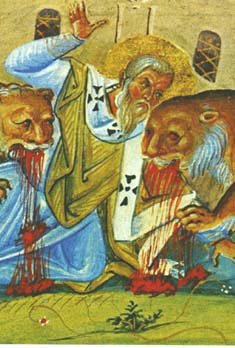 Contents -
Previous Article -
Next Article
Contents -
Previous Article -
Next Article
The persecution of Christians by the Roman Government was not a consistent policy that was enforced the same way by every Roman provincial governor or government official or even by different emperors. Most of the time, Christians were tolerated but were viewed as strange and somewhat antisocial by most of the Roman people.
Because the Roman gods were actually a part of the state religion, and it was thought that they must be worshipped regularly in order for the Romans to have victory in war and prosperity at home, it was considered a roman's patriotic duty to sacrifice regularly to Jupiter, Mars, Juno, Vesta, and leave offerings out for the household gods, the Lares and Penates. The Christians, on the other hand, believed in one God and worship Him in three persons, Father, Son, and Holy Ghost. Making sacrifice to Jupiter or Poseidon was (and still is) abhorrent to a Christian. Because the Romans believed that the favor of the gods was necessary to the security of the state, the Christians were believed to be not only impious and anti-religious but unpatriotic as well. In addition, many Christians refused to serve in the army because they might have to kill other human beings and thus violate the commandments of Christ. Similarly, some Christians refused to hold government posts, engage in commerce, or loan money because they saw these activities as lending approval to a corrupt earthly system. They believed that the only true empire was in heaven. As a result, the Roman government saw fit to persecute the Christians from time to time, especially during unsettled periods when a popular reform movement arose to return to the old Roman ways and values. Most Roman magistrates believed themselves to be enlightened and the government they represented to be merciful. and gave the Christians many opportunities to renounce their "strange unpatriotic beliefs" before condemning Christians to death in the arena or by formal execution. They absolutely could not understand why a Christian would choose a shameful, agonizing public death over being reinstated as a full citizen with all privileges when all the person needed to do was make a sacrifice for the health of the emperor or even just sprinkle a little incense over a lighted altar. The crowds who came to witness the games were a different matter altogether. Sometimes they became worked up into a frenzy of hate. They considered the Christians to be antisocial scum and clamored for a painful death for them in the arena, being mauled and torn apart by wild beasts or forced to fight gladiators who killed them for a public spectacle.
The most famous of the Christian persecutions was under Nero. A disastrous fire destroyed much of Rome in the year A. D. 64. Somehow, a rumor started circulating that Nero himself started the fire in order to rebuild the city. It was well-known that Nero considered much of Rome ugly and squalid. Whether or not he had any part in setting the fire is still being debated to this day, but the rumors started to spread and might become a threat to Nero's reign and life if left unchecked. He therefore decided to blame the antisocial and subversive Christians for starting the fire. after all, didn't they hold worship services underground in the city tombs known as catacombs? To make sure he was believed in accusing the Christians of setting the fire, he had many of them killed. Some were crucified in the arena, others thrown to wild animals, and still others were burned alive as living torches to light Nero's garden at his Golden House. St. Peter died during the Neronian persecutions. Because of this most well known persecution, Nero was written into history as one of the most depraved and cruel of the Roman emperors.
Persecutions were renewed under Septimius Severus, Trajan Decius, Valerian, Gallienus, and Diocletian. The Second Century emperor Trajan instructed one of his provincial governors, Pliny the Younger, to not actively seek out Christians who were in violation of the law. Nevertheless, some Christians desired the crown of martyrdom so greatly that they openly proclaimed their faith. Some, but not very many, were condemned to death under Trajan. Severus Alexander and his mother, Julia Mamaea, were interested in all gods, philosophies, and religions. It is said that Severus Alexander actually kept a statue of Jesus amongst the statues of other gods in his own personal shrine.
Persecutions were particularly acute under Decius and Diocletian. These emperors sought to revive worship of the old Roman gods and bring back a respect for ancient custom. After a particularly intense period of persecution under Diocletian, Christians were finally given the legal right to worship as they pleased under the Edict of Milan, issued in A. D. 313 by Constantine I. Seventy five years later, Christianity had become so influential and Christians had such power that the emperor Gratian had the ancient statue of Victory removed from the Roman Senate House on the insistence of the very powerful and influential Archbishop Ambrose of Milan.
Go to next article: The Martyrdom of Perpetua
Go back to previous article: Jesus of Nazareth, The Alpha and the Omega
Return to Christians table of contents